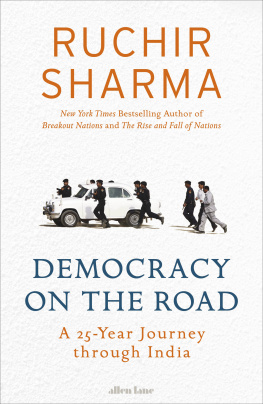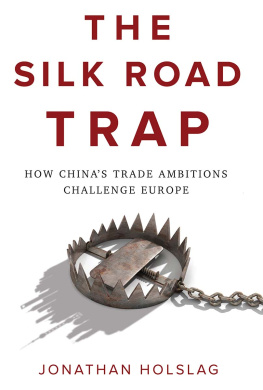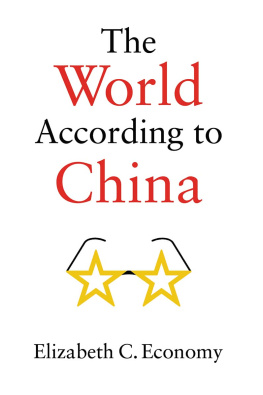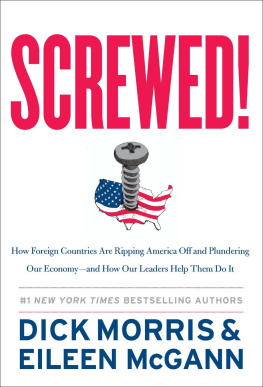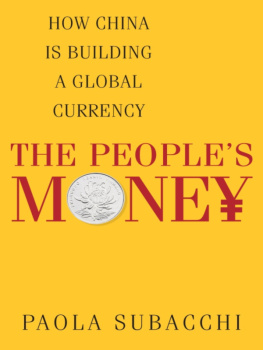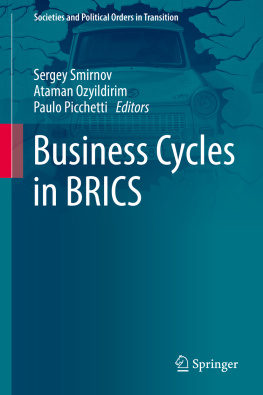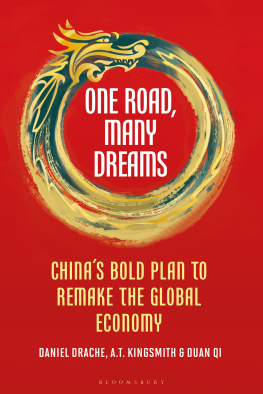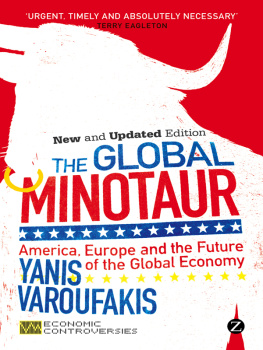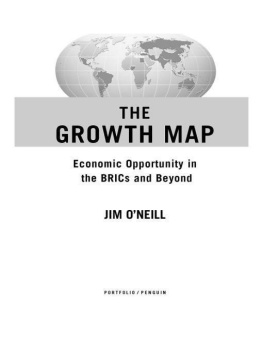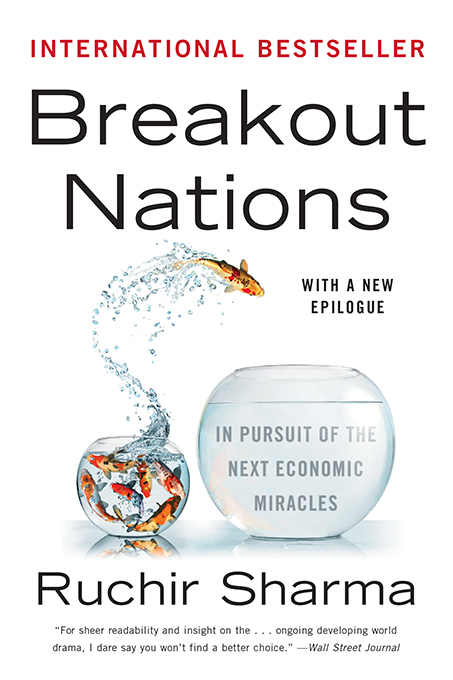
BREAKOUT
NATIONS

In Pursuit of the
Next Economic Miracles
RUCHIR SHARMA

W. W. NORTON & COMPANY
New York London
CONTENTS
PROLOGUE
Its been a long time since the farmers left the farmhouses of Delhi, and though the name lives on, it now describes the weekend retreats of the upper class, playgrounds on the fringes of the city where unmapped dirt lanes wind through poor villages and suddenly open onto lavish mansions with sprawling gardens and water features; in one case I even came upon a garden with a mini-railroad running through it. This is the Hamptons of Delhi, the citys party central, where event planners will re-create Oscar night, Broadway, Las Vegas, even a Punjabi village for the homesick, complete with waiters in ethnic garb.
On a foggy night in late 2010 I made my way to one of these famously decadent bashes, where the valets were juggling black Bentleys and red Porsches, and the hosts invited me to try the Kobe beef they had flown in from Japan, the white truffles from Italy, the beluga caviar from Azerbaijan. It was hard to talk over the pulsating techno-beat, but I managed to engage in a chat with a twenty-something son of the farmhouse demimondehe was a classic of the type, working for his dads export business (it always seems to be exports), wearing a tight black shirt, hair spiky with grooming gel. After determining that I was a New Yorkbased investor back in town to search for investment opportunities, he shrugged and remarked, Well, of course. Where else will the money go?
Where else will the money go? I left the party around midnight, well before the main course was served, but the comment stayed with me. It should have stroked my sense of self-importance as an emerging-market investor. After all, the size of my teams fund had surged more than threefold over the past decade, and if the trend continuedsomething the partying youth seemed to take for grantedthen emerging-market investors would be the masters of the universe.
Instead an Urdu couplet came back to haunt me: I am so stunned by my prosperity that my happiness has begun to make me anxious. I began my investing career in the mid-1990s, when one developing country after another was hit by economic crisis and emerging markets were seen as the problem children of the financial world. By the end of that decade some of my colleagues were rechristening these orphaned assets the e-merging markets in an attempt to pick up some of the stardust from the tech boom in the United States.
Emerging markets were spoofed in investment circles as an inversion of the 80/20 rule, which states that 80 percent of your profit comes from the top 20 percent of your clients. For much of postWorld War II history, emerging markets accounted for 80 percent of the worlds population but only 20 percent of its economic output. When Latin America was on the rise in the 1960s and 1970s, Africa and large parts of Asia were on the decline, and when broad swaths of Asia were growing at a rapid clip, in the 1980s and 1990s, Latin American nations could not seem to get their growth act together, while Africa was dismissed as the Hopeless Continent. Even as late as 2002 the big-money investorspension funds, college endowmentssaw emerging markets as too small to move the needle on multibillion dollar funds, or just too dangerous, because vast countries like India were seen as the Wild East of investing.
So here I was only a few years later, standing with some spoiled kid in the fog and the pounding din, and he is feeling on top of the world because his dad is one of some thirty thousand dollar-millionaires in Delhi, most of them newly minted. He has seen little of the world beyond the isolated farmhouses, and yet he knows enough to parrot the sentiment of emerging markets everywhere: Where else will the money go?
Well, he had recent trends on his side. Private capital flows into developing countries had surged from an annual pace of $200 billion in 2000 to nearly a trillion dollars a year in 2010. Even on Wall Street, all the experts were saying the West was in terminal decline, so the money was bound to flow east and south.
It also occurred to me how the dramatic change in sentiment was affecting the attitudes of politicians and businesspeople in the emerging world. When I visited Egypt nearly a decade ago, I was made to feel like an honored state guest of Prime Minister Ahmed Nazif, who invited dozens of media photographers for a ten-minute photo-op, and used my face on the financial pages to demonstrate that foreign investors were beginning to pay attention to his country. Flash forward to October 2010, when I made a televised presentation to Russian prime minister Vladimir Putin in Moscow, in which I was not exactly exuberant about his countrys future. Some local media responded with taunts, saying that Russia could do without my funds money.
By the middle of the last decade it seemed that every man and his dog could raise money for emerging markets. By the end, it appeared that just the dog would do. Yet history suggests economic development is like a game of snakes and ladders. There is no straight path to the top, and there are fewer ladders than snakes, which means that its much easier to fall than to climb. A nation can climb the ladders for a decade, two decades, three decades, only to hit a snake and fall back to the bottom, where it must start over again, and maybe again and again, while rivals pass it by. That kind of failure happens a lot more often than making it to the top. There is a huge pool of competitors, and only a few nations defy the long odds against success. Those are the rare breakout nations, and they beat the game by growing faster than rivals in their own income class, so that a nation whose per capita income is under $5,000 competes with rivals in that class. The growth game is all about beating expectations, and your peers.
The perception that the growth game had suddenly become easythat everyone could be a winneris built on the unique results of the last decade, when virtually all emerging markets did grow together. But that was both the first and, in all probability, the last time we will ever see such a golden age: the next decade will almost certainly not bring more of the same.
For the last fifteen years I have typically spent one week every month in a particular emerging market, obsessing about it, meeting all sorts of local characters, and traveling the breadth of the country, mostly by road. As the writer Aldous Huxley put it, To travel is to discover that everyone is wrong about other countries. Reading Excel spreadsheets in the office cant tell you, for example, whether a political regime gets the connection between good economics and good politics.
No one can pinpoint the precise mix of reasons why nations grow, or fail to grow. There is no magic formula, only a long list of known ingredients: allow the free-market flow of goods, money, and people; encourage savings, and make sure banks are funneling the money into productive investments; impose the rule of law and protect property rights; stabilize the economy with low budget and trade deficits; keep inflation in check; open doors to foreign capital, particularly when the capital comes with technology as part of the bargain; build better roads and schools; feed the children; and so on. This is armchair academics, clichs that are true but that offer only a long list of dos with no real insight into how these factors will or will not combine to produce growth in any given country at any given time.
Next page





